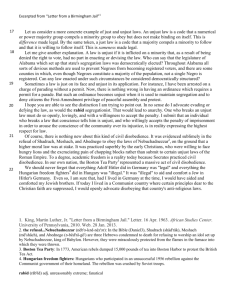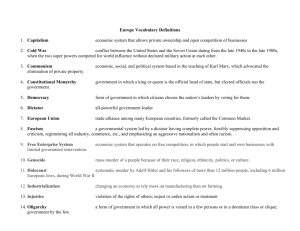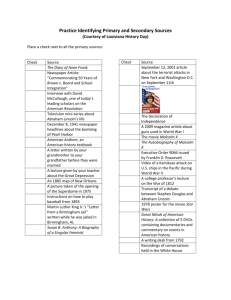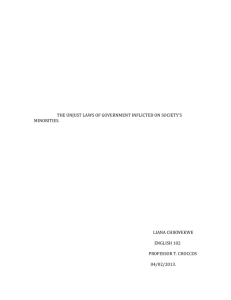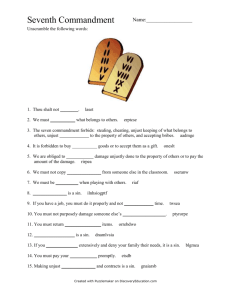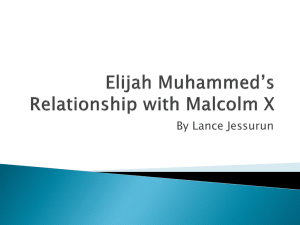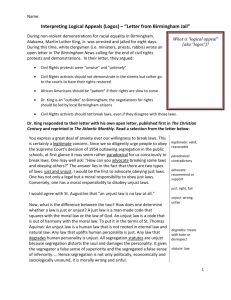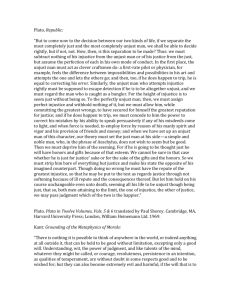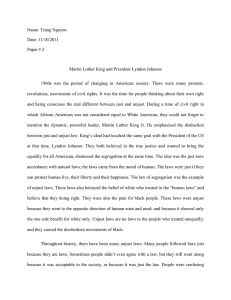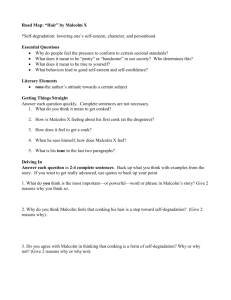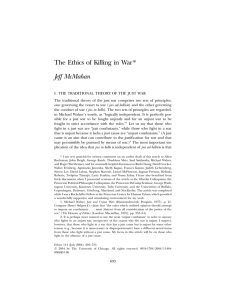“Letter from Birmingham Jail” Reading Guide 'Sample'
advertisement
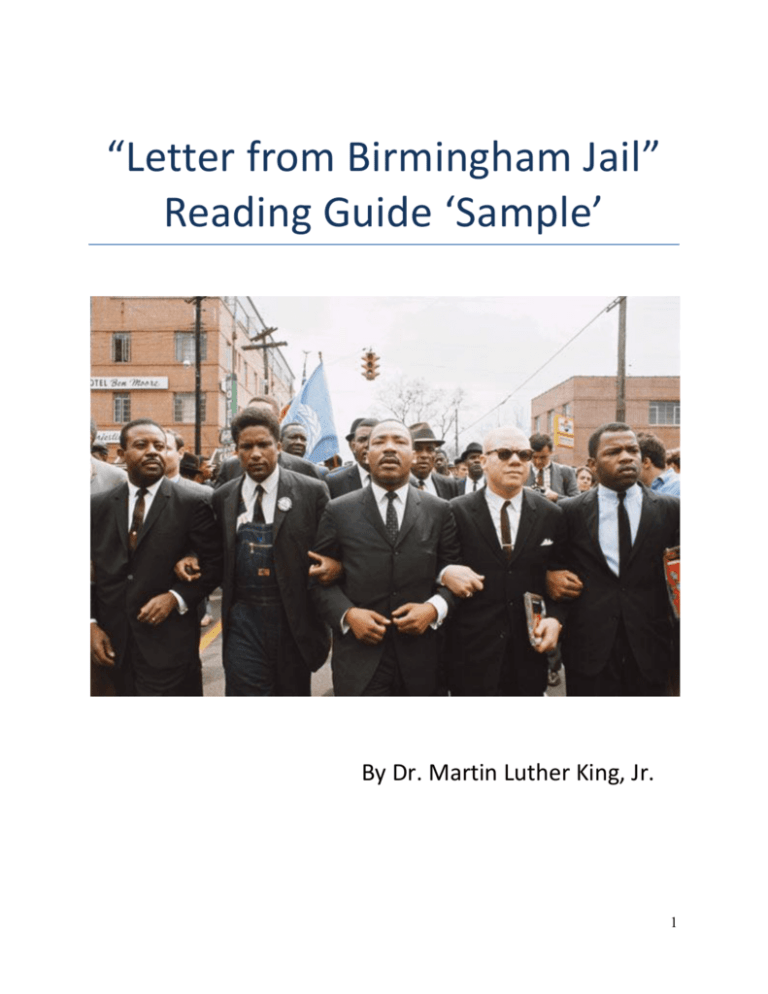
“Letter from Birmingham Jail” Reading Guide ‘Sample’ By Dr. Martin Luther King, Jr. 1 The following is a sample of the material included in our monthly reading guides: Principles: 1. “Injustice anywhere is a threat to justice everywhere.” 2. Self-purification is necessary before direct action is taken. 3. Historically freedom has not been given by the oppressor; it must be demanded by the oppressed. 4. “Sin is separation.” 5. “Time is neutral.” Natural Law: Martin Luther King, Jr. on natural law from the reading: “…there are two types of laws: there are just and there are unjust laws. I would agree with Saint Augustine that ‘An unjust law is no law at all.’ Now what is the difference between the two? A just law is a man-made code that squares with the moral law or the law of God. An unjust law is a code that is out of harmony with the moral law. To put it in terms of Saint Thomas Aquinas, an unjust law is a human law that is not rooted in eternal or natural law. Any law that uplifts human personality is just. Any law that degrades human personality is unjust… Let us turn to a more concrete example of just and unjust laws. An unjust law is a code that a majority inflicts on a minority that is not binding on itself. This is difference made legal. On the other hand a just law is a code that a majority compels on a minority to follow that it is willing to follow itself. This is sameness made legal. Let me give another explanation. An unjust law is a code inflicted upon a minority which that minority had no part in enacting or creating because they did not have the unhampered right to vote… There are [also] some instances when a law is just on its face and unjust in its application.” 1. Consider how these clarifications of just and unjust laws can be applied in a home and work environment. Are there ever just and unjust laws in these places? How will an understanding of natural law improve the laws we create and control at home and work? 2 2. Ponder his explanations and compare them to America’s Founding period and the “taxation without representation” issue. You could even compare this reading to the Declaration of Independence. Monthly Challenge: Find as many natural laws in the reading as you can and send them to the online group for discussion. Themes: *Track these as you read 1. 2. 3. 4. 5. Natural rights Silence Waiting and time Freedom Education Thought and Discussion Questions: 1. What is the letter to Martin Luther King from the pastor’s asking King to do? What are they upset about? Why? Do they have good cause? 2. How does King answer the pastors’ concerns? Does he make his points? Who is right? 3. Why did King almost never answer criticisms? Why did he answer this one? 4. What does King say about the city of Birmingham? How would these pastors have taken King’s criticism in this letter? 5. Was King diplomatic? Why or why not? 6. Did he speak the truth? How do you know? Enrichment Materials: Videos: 1. The first 8 minutes of this video contains a clear background on segregation in Birmingham, Alabama in the 1960’s. The rest of the videos gives details of how the March on Washington was organized: https://www.youtube.com/watch?v=RmRmf5VqcGs 2. Debate between Dr. Martin Luther King, Jr. and Malcolm X: https://www.youtube.com/watch?v=6HGr-UJSf9k 3 Civil Rights Personalities, Events and Issues: *You can research the following to learn more about the Civil Rights Movement: 1. In the letter, King states, “I stand in the middle of two opposing forces in the Negro community. One is a force of complacency…The other force is one of bitterness and hatred, and comes perilously close to advocating violence. It is expressed in the various black nationalist groups that are springing up over the nation, the largest and best known being Elijah Muhammad’s Muslin Movement.” Here King is referencing Malcolm X and his leadership under Elijah Muhammad in evangelizing black conversion to Elijah’s specific brand of Islamic belief. Malcolm X has a fascinating personal history that is virtually directly opposite to the life and experiences of King. His is a fascinating story which has been detailed in The Autobiography of Malcolm X: As Told by Alex Haley. Malcolm X collaborated extensively on this autobiography and approved it before his death. A big word of caution here, though, if you decide to dig deeper and read this book. While I learned much in this autobiography and for several reasons am glad I read it, the nature of Malcolm’s lifestyle before his conversion to Islam is graphically told here and there are selections I wish I had never read because of their vile nature. Youth should definitely not read it and adults should read it with caution, perhaps skipping those sections that begin to describe Malcolm’s activities in detail. Some things to look for if you do read it would be: 1. Look for the formation of Malcolm’s core beliefs in childhood 2. Consider why he chooses the lifestyle he does before prison 3. Look at his self-education for the books that he reads, how he read them and what he is looking for. He is forming his worldview during his studies in prison and it defines the rest of his life. 4
